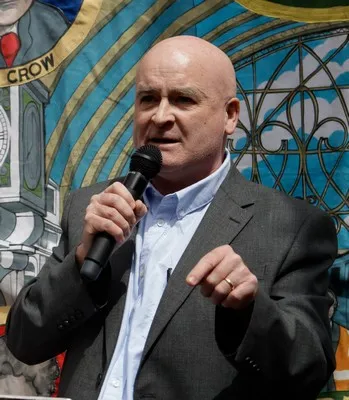Table of Contents
- Background and Context
- Leadership Style
- Mick Lynch and the Power of the Media
- Socio-Economic Context
- The Political Landscape
- Importance of Mick Lynch in UK Politics
- Criticisms and Controversies
- Conclusion
- Poll
- Think!
- Essay Suggestions
- Research Suggestions
- Further Reading
Mick Lynch, the General Secretary of the National Union of Rail, Maritime and Transport Workers (RMT) in the UK, has emerged as a prominent and polarizing figure in contemporary labor politics. His leadership style, communication strategies, and the socio-political context in which he operates contribute to his broad appeal. This essay explores the multifaceted appeal of Mick Lynch by examining his background, leadership style, public communication, and the wider socio-economic environment.
Background and Context
The Role of Trade Unions
Trade unions have historically played a critical role in advocating for workers’ rights, securing better wages, working conditions, and social justice. In the UK, unions have a storied history of both confrontation and cooperation with employers and the state. The RMT, one of the most militant and vocal unions, represents workers in transport industries, which are essential to the national economy and daily life.
Mick Lynch’s Background
Mick Lynch was born in 1962 and grew up in a working-class Irish Catholic family in London. His personal history is intertwined with the working-class struggle, having left school at 16 to become an electrician and later working on the railways. Lynch’s direct experience of working-class life and his rise through union ranks provide him with an authentic voice that resonates with many workers.
Leadership Style
Charismatic Leadership
Lynch’s appeal can be partially attributed to his charismatic leadership. Max Weber’s theory of charismatic authority describes a leader whose personal qualities inspire loyalty and enthusiasm. Lynch embodies this through his straightforward, no-nonsense approach and his ability to articulate complex issues in an accessible manner. His charisma is not just about personal charm but also his ability to connect with workers’ everyday struggles and aspirations.
Strategic Militancy
Lynch’s leadership is also characterized by strategic militancy. Unlike some union leaders who prefer a more conciliatory approach, Lynch advocates for robust, direct action to achieve union goals. This militancy is seen in his willingness to call for strikes and challenge powerful employers and government policies. The strategic aspect comes from his careful planning and clear communication about the reasons and objectives of such actions, which ensures that members feel informed and united.
Mick Lynch and the Power of the Media
Authenticity and Relatability
Lynch’s communication style is marked by authenticity and relatability. He speaks in a straightforward manner that avoids jargon, making his messages accessible to a wide audience. This authenticity helps to build trust, as workers and the public perceive him as genuine and sincere. In an era where political and corporate speech is often seen as insincere or manipulative, Lynch’s straightforwardness is refreshing and appealing.
Media Savviness and Strategic Communication
Mick Lynch’s prominence in UK politics is not solely due to his leadership within the RMT; it also stems from his adeptness at navigating and utilizing the media landscape. Lynch’s ability to handle media interactions with composure and clarity has significantly bolstered his and his union’s public profile. This media savviness is essential in an era where media portrayal can significantly influence public opinion and political outcomes.
Challenging Media Narratives
One of Lynch’s key contributions is his ability to challenge and subvert negative media narratives about trade unions and industrial action. Historically, media coverage of strikes and union activities has often been biased, portraying unions as disruptive forces and their leaders as unreasonable. Lynch counters this by presenting well-reasoned arguments and explaining the rationale behind industrial actions. His ability to articulate the broader social and economic context of strikes helps the public understand the necessity and legitimacy of union actions.
Mastering the Soundbite
Lynch’s skill in mastering the soundbite—a concise and impactful statement that encapsulates a complex issue—is a crucial aspect of his media strategy. In an age of 24-hour news cycles and social media, delivering clear, memorable messages is vital. Lynch’s soundbites often resonate with wider audiences, helping to distill complex labor issues into easily understandable terms. This not only aids in garnering public support but also in maintaining the momentum of union campaigns.
Confronting Media Bias
Get the full article AD FREE. Join now for full access to all premium articles.
View Plans & Subscribe Already a member? Log in.





